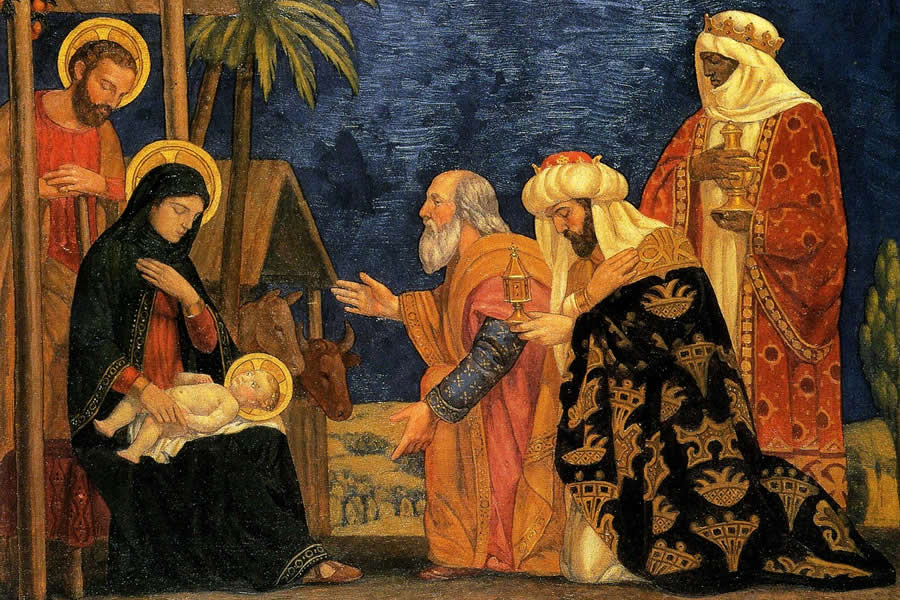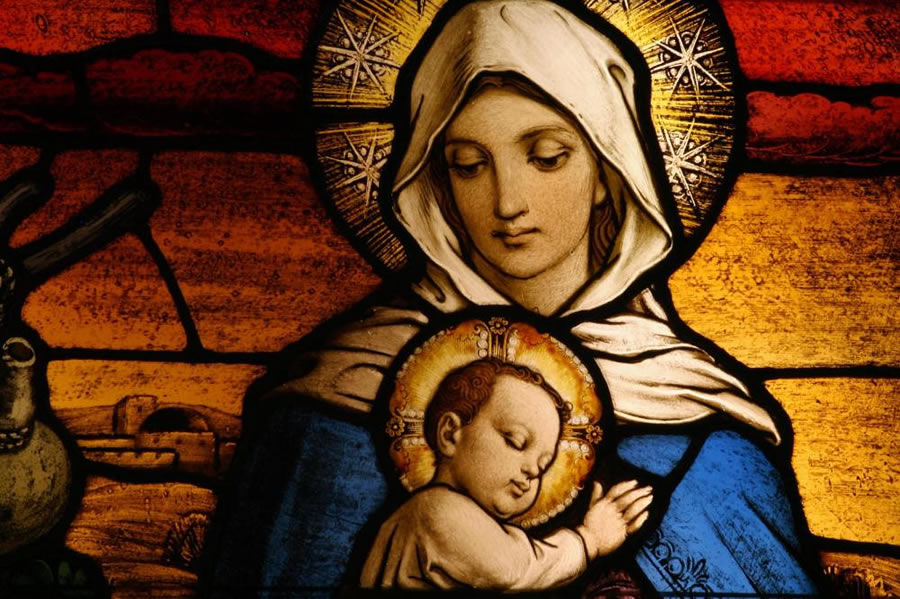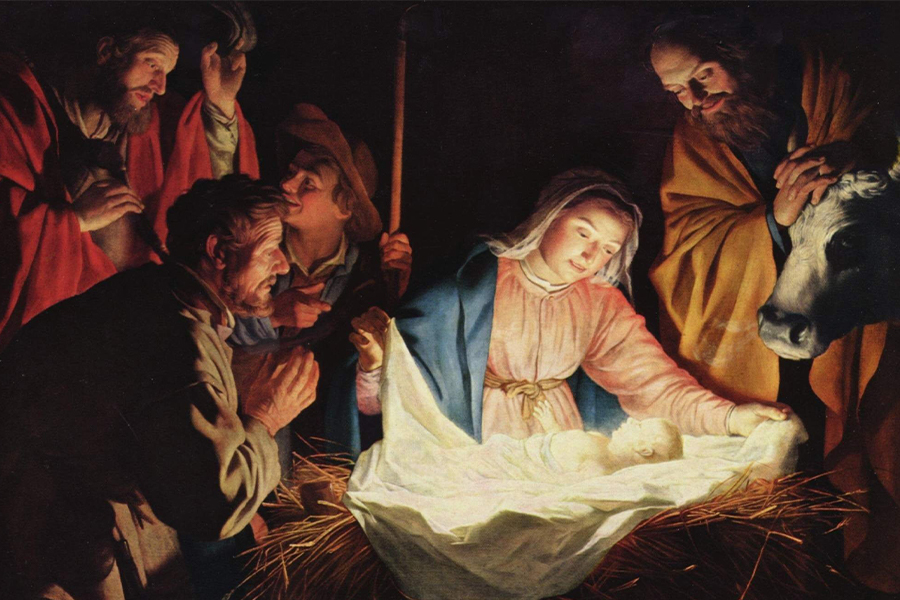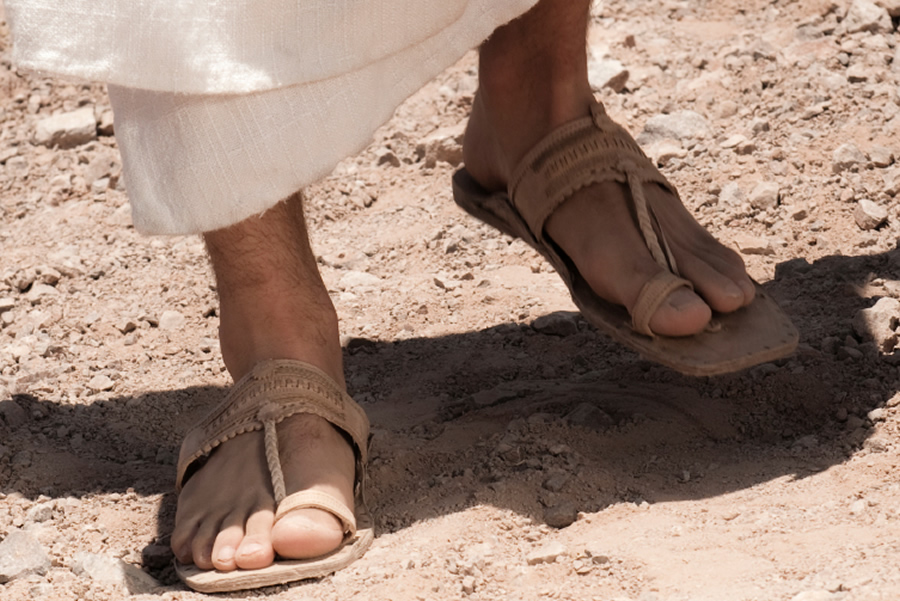St. Francis of Assisi Weekly Reflections
Blessed Are We
01-29-2023Question of the WeekReading I: Zephaniah 2:3; 3:12-13 - Promise for Jerusalem
Reading II: 1 Corinthians 1:26-31 - Paradox of God’s choice
Gospel: Matthew 5:1-12a - The Beatitudes
Key Passage: Blessed are you when people revile you and persecute you and utter all kinds of evil against you falsely on my account. Rejoice and be glad, for your reward is great in heaven, for in the same way they persecuted the prophets who were before you. (Matthew 5:11–12)
Adults: When you heard the Beatitudes announced today, which one struck you most strongly?
Kids: Who is welcome in the reign of God? Who would you like to tell about the reign of God?
Benditos Somos
Lectura I: Sofonías 2:3; 3:12-13 - Promesa para Jerusalén
Lectura II: 1 Corintios 1:26-31 - Paradoja de la elección de Dios
Evangelio: Mateo 5:1-12a - Las Bienaventuranzas
Pasaje Clave: Dichosos serán ustedes cuando por mi causa la gente los insulte, los persiga y levante contra ustedes toda clase de calumnias. Alégrense y llénense de júbilo, porque les espera una gran recompensa en el cielo. Así también persiguieron a los profetas que los precedieron a ustedes . (Mateo 5:11–12)
Adultos: Cuando escuchaste el anuncio de las Bienaventuranzas hoy, ¿cuál te impresionó más?
Niños: ¿Quién es bienvenido en el reino de Dios? ¿A quién te gustaría contarle sobre el reino de Dios?

We Depend on God
01-29-2023Weekly ReflectionWe Celebrate Worship Resource, Vol. 48, No. 1What does it mean to be truly humble, not merely avoiding boastfulness and arrogance, and certainly not full of the false humility that just draws attention to itself? To see what humility really means, let’s look at today’s readings. Zephaniah says those who are humble observe God’s law. They realize that God’s law provides a better foundation for living than their own selfish interests. The prophet also says that the humble and the lowly take refuge in the Lord. They rely on a higher power for safety and comfort. Saint Paul draws a clear line between those who recognize that their calling is from God and those who ignore that. Those who ignore it think they are wise and strong and noble, and that they got this way on their own. But those who live in Christ realize that they share in the wisdom and power of God, enabling them to boast in the Lord. They acknowledge that God is the source of all our abilities and talents. Jesus calls the meek and the poor in spirit, the insulted and persecuted, blessed. They are blessed, for they have the humility to recognize that they are not in control of their own fates, that they must rely on God for salvation and satisfaction. To be truly humble is to recognize that ultimately none of us is in control of our own success. We depend on God.
How can you grow in humility? Can you recognize the blessedness of your dependence on God?
Dependemos De Dios
¿Qué significa ser verdaderamente humilde, no simplemente evitando la jactancia y la arrogancia, y ciertamente no lleno de la falsa humildad que solo llama la atención sobre sí misma? Para ver lo que realmente significa la humildad, veamos las lecturas de hoy. Sofonías dice que aquellos que son humildes observan la ley de Dios. Se dan cuenta de que la ley de Dios proporciona una mejor base para vivir que sus propios intereses egoístas. El profeta también dice que los humildes y los humildes se refugian en el Señor. Se basan en una potencia superior para la seguridad y la comodidad. San Pablo traza una línea clara entre aquellos que reconocen que su llamado es de Dios y aquellos que lo ignoran. Aquellos que lo ignoran piensan que son sabios, fuertes y nobles, y que lo lograron por sí mismos. Pero los que viven en Cristo se dan cuenta de que comparten la sabiduría y el poder de Dios, lo que les permite gloriarse en el Señor. Reconocen que Dios es la fuente de todas nuestras habilidades y talentos. Jesús llama bienaventurados a los mansos y pobres de espíritu, a los ultrajados y perseguidos. Son bendecidos, porque tienen la humildad de reconocer que no tienen el control de sus propios destinos, deben confiar en Dios para su salvación y satisfacción. Ser verdaderamente humilde es reconocer que, en última instancia, ninguno de nosotros tiene el control de nuestro propio éxito. Dependemos de Dios.
¿Cómo puedes crecer en humildad? ¿Puedes reconocer la bienaventuranza de tu dependencia de Dios?

The Kingdom of Heaven is at Hand
01-22-2023Weekly ReflectionWe Celebrate Worship Resource, Vol. 48, No. 1Simon Peter couldn’t have guessed what the future held for him. We know now that over the next three years he goes from unbounded exuberance—trying to walk on water—to brutal disloyalty—denying that he even knows Jesus. He will be reprimanded— “Get behind me, Satan!” — and rewarded— “Upon this rock I will build my church” (Matthew 16:18, 23). But on this day on the shore of the Sea of Galilee, having just met the man and not knowing what he was getting himself into, he accepts at once, leaving a steady job to become a fisher of others. Only after he joins Jesus is he able to see him teach, proclaim the gospel, and heal the sick. Jesus’ first message is the same as John the Baptist’s, but the meaning of “the kingdom of heaven is at hand” had changed (Matthew 3:2, 4:17). For John, the kingdom was immanent, about to come. In Jesus, the kingdom is immanent, here with us. So too Jesus is immanent now, here in this assembly, here in the Eucharist, here in us and in those we meet. We don’t know what our future holds, but we too are invited to come with Jesus, to fish for others, and to help make the kingdom immanent right here and now.
How are you called to be a disciple? How will you respond?
El Reino De Los Cielos Se Ha Acercado
Simón Pedro no podría haber adivinado lo que le deparaba el futuro. Ahora sabemos que durante los próximos tres años él pasa de la exuberancia sin límites, tratando de caminar sobre el agua, a la deslealtad brutal, negando que conoce a Jesús. Será amonestado: “¡Quítate de delante de mí, Satanás !” — y recompensado— “Sobre esta roca edificaré mi iglesia” (Mateo 16:18, 23). Pero ese día en la orilla del mar de Galilea, recién conocido al hombre y sin saber en qué se estaba metiendo, acepta de inmediato, dejando un trabajo estable para convertirse en pescador de otros. Solo después de unirse a Jesús, puede verlo enseñar, proclamar el evangelio y sanar a los enfermos. El primer mensaje de Jesús es el mismo que el de Juan el Bautista, pero el significado de “el reino de los cielos se ha acercado” había cambiado (Mateo 3:2, 4:17). Para Juan, el reino era inminente, estaba a punto de llegar. En Jesús, el reino es inmanente, aquí con nosotros. Así también Jesús es inmanente ahora, aquí en esta asamblea, aquí en la Eucaristía, aquí en nosotros y en aquellos con quienes nos encontramos. No sabemos lo que nos depara el futuro, pero también estamos invitados a venir con Jesús, a pescar para otros y a ayudar a que el reino sea inmanente aquí y ahora.
¿Cómo estás llamado a ser un discípulo? ¿Cómo responderás?
Following Jesus
01-22-2023Question of the WeekReading I: Isaiah 8:23-9:3 - The Prince of Peace
Reading II: 1 Corinthians 1:10-13, 17 - Factions
Gospel: Matthew 4:12-23 - Jesus in Capernaum
Key Passage: Jesus went throughout Galilee, teaching in their synagogues and proclaiming the good news of the kingdom and curing every disease and every sickness among the people. (Matthew 4:23)
Adults: To whom could you preach the gospel of Jesus Christ this week with actions rather than words?
Kids: What could you do for someone this week that would tell them something about Jesus?
Siguiendo A Jesús
Lectura I: Isaías 8:23-9:3 - El Príncipe de Paz
Lectura II: 1 Corintios 1:10-13, 17 - Facciones
Evangelio: Mateo 4:12-23 - Jesús en Cafarnaúm
Pasaje Clave: Jesús recorrió Galilea, enseñando en las sinagogas Y proclamando la buena nueva del Reino de Dios y curando a toda la gente de toda enfermedad y dolencia. (Mateo 4:23)
Adultos: ¿A quién podrías predicar el evangelio de Jesucristo esta semana con hechos en lugar de palabras?
Niños: ¿Qué podrías hacer por alguien esta semana que les diga algo acerca de Jesús?
Jesus, The Son of God
01-15-2023Question of the WeekReading I: Isaiah 49:3, 5-6 - The servant of the Lord
Reading II: 1 Corinthians 1:1-3 - Greeting to the church
Gospel: John 1:29-34 - John’s testimony to Jesus
Key Passage: [John said,] “I myself did not know him; but I came baptizing with water for this reason, that he might be revealed to Israel.” (John 1:31)
Adults: We witness to Christ as John did, by living lives full of
generosity, forgiveness, and mercy toward others. When do
you find it most difficult to do this?
Kids: Who has surprised you by doing something kind for
you when you did not expect it?
Jesús, El Hijo De Dios
Lectura I: Isaías 49, 3, 5-6 - El siervo del Señor
Lectura II: 1 Corintios 1:1-3 - Saludo a la iglesia
Evangelio: Juan 1:29-34 - El testimonio de Juan sobre Jesús
Pasaje Clave: [Juan dijo:] “Yo no le conocía; mas para que fuese manifestado a Israel, por esto vine yo bautizando con agua.” (Juan 1:31)
Adultos: Damos testimonio de Cristo como lo hizo Juan, viviendo vidas llenas de generosidad, perdón y misericordia hacia los demás. ¿Cuándo te resulta más difícil hacer esto?
Niños: ¿Quién te ha sorprendido haciendo algo amable por ti
cuando no lo esperabas?

Shine the Light of Christ
01-15-2023Weekly ReflectionWe Celebrate Worship Resource, Vol. 48, No. 1Isaiah, Paul, and John. Each one prepares us for the coming of the Lord. Isaiah calls the people of Israel back home after many years of exile in Babylon. But they are not the only ones. God has made the prophet a light to the nations, so that salvation can reach all the way to the ends of the earth. This sounds joyous, and it is, but it is also challenging. Isaiah welcomes not just descendants of Abraham but everyone, even enemies, even those who had just held them captive. But this is the way light works. It does not discriminate; it shines on everyone. Paul, apostle to the Gentiles, knows this well. Corinth was nearly a thousand miles from Bethlehem or Galilee or Jerusalem. Yet its people were just as welcome to become Christian, to become brothers and sisters in faith, as those who could trace their lineage back to David. John the Baptizer, the mystic emerging from his time in the wilderness, saw the Holy Spirit descend upon Jesus when he baptized him. Like light, the Spirit illuminates the whole world. Today we are called to follow their lead—shining the light of Christ, passing on Spirit, spreading the saving grace of God throughout our family, our community, and our world.
Is there a situation in your life that can use God’s welcome, God’s grace, God’s mercy? How can you apply those to that situation?
Brilla Con La Luz De Cristo
Isaías, Pablo y Juan. Cada uno nos prepara para la venida del Señor. Isaías llama al pueblo de Israel de vuelta a casa después de muchos años de exilio en Babilonia. Pero no son los únicos. Dios ha hecho del profeta una luz para las naciones, para que la salvación llegue hasta los confines de la tierra. Esto suena alegre, y lo es, pero también es un desafío. Isaías da la bienvenida no solo a los descendientes de Abraham, sino a todos, incluso a los enemigos, incluso a aquellos que acababan de tenerlos cautivos. Pero así es como funciona la luz. No discrimina; brilla en todos. Pablo, apóstol de los gentiles, lo sabe bien. Corinto estaba a casi mil millas de Belén, Galilea o Jerusalén. Sin embargo, su gente era tan bienvenida para convertirse en cristianos, para convertirse en hermanos y hermanas en la fe, como aquellos que podían rastrear su linaje hasta David. Juan el Bautista, el místico que emerge de su tiempo en el desierto, vio al Espíritu Santo descender sobre Jesús cuando lo bautizó. Como la luz, el Espíritu ilumina el mundo entero. Hoy estamos llamados a seguir su ejemplo: hacer brillar la luz de Cristo, transmitir el Espíritu, difundir la gracia salvadora de Dios en nuestra familia, nuestra comunidad y nuestro mundo.
¿Hay alguna situación en tu vida en que puedas usar la bienvenida de Dios, la gracia de Dios, la misericordia de Dios? ¿Cómo puedes aplicarlos a esa situación?

Where Can We Find Christ Today?
01-08-2023Weekly ReflectionWe Celebrate Worship Resource, Vol. 48, No. 1Where do you suppose the magi expected to end up when they began their journey from the east? A bright star like the one they had seen at its rising was regarded as a sign that a great ruler was born. As they traveled, they must have marveled at this especially bright star growing brighter and brighter each night as they drew closer to Bethlehem. We are told that their initial destination, however, was nearby Jerusalem. Of course! It was the most prominent city in the area, the capital of Judea, the site of the temple, the home of the king. Where else would they look for a newborn ruler as powerful as this star? But God’s signs are rarely straightforward as we would like. Much as David was the unexpected choice among Jesse’s sons, the Son of David was not found where the magi expected—not in Herod’s home, not in a palace, not in Jerusalem at all. They found the newborn king in a feeding trough, in a stable, in the last place they would have expected. Before his death, Jesus himself surprises his disciples as to where they can find him, telling them he is found in the least among them. Then and now, he can be found where we least expect him. May we reorient our vision.
Where can you look for Christ? Have others found Christ within you?
¿DONDE PODEMOS ENCONTRAR A CRISTO HOY?
¿Donde supones que los magos esperaban terminar cuando comenzaron su viaje desde el este? Una estrella brillante como la que habían visto salir era considerada una señal de que había nacido un gran gobernante. Mientras viajaban, deben haberse maravillado de esta estrella especialmente brillante que se hacía más y más brillante cada noche a medida que se acercaban a Belén. Se nos dice que su destino inicial, sin embargo, estaba cerca de Jerusalén. ¡Por supuesto! Era la ciudad más prominente de la zona, la capital de Judea, el sitio del templo, el hogar del rey. ¿Dónde más buscarían un gobernante recién nacido tan poderoso como esta estrella? Pero las señales de Dios rara vez son sencillas como nos gustaría. Por mucho que David fuera la elección inesperada entre los hijos de Isaí, el Hijo de David no fue encontrado donde los magos esperaban: ni en la casa de Herodes, ni en un palacio, ni en Jerusalén en absoluto. Encontraron al rey recién nacido en un comedero, en un establo, en el último lugar que habrían esperado. Antes de su muerte, el mismo Jesús sorprende a sus discípulos sobre dónde pueden encontrarlo, diciéndoles que se encuentra en los más pequeños entre ellos. Entonces y ahora, se le puede encontrar donde menos lo esperamos. Reorientemos nuestra visión.
¿Dónde puedes buscar a Cristo? ¿Han encontrado otros a Cristo dentro de ti?
A Gift For All People
01-08-2023Question of the WeekReading I: Isaiah 60:1-6 - Glory of the new Zion
Reading II: Ephesians 3:2-3a, 5-6 - Commission to preach God’s plan
Gospel: Matthew 2:1-12 - The visit of the magi
Key Passage: In the time of King Herod, after Jesus was born in Bethlehem of Judea, wise men from the East came to Jerusalem, “Where is the Child: who has been born king of the Jews? For we observed his star at its rising, and have come to pay him homage.” (Matthew 2:1–2)
Adults: The Magi were strangers from another land. How do you welcome immigrants and strangers in the name of Christ?
Kids: What could you do to be like a star and lead someone to know about Jesus?
UN REGALO PARA TODAS LA PERSONAS
Lectura I: Isaías 60,1-6 - Gloria de la nueva Sión
Lectura II: Efesios 3:2-3a, 5-6 - Comisión para predicar el plan de Dios
Evangelio: Mateo 2:1-12 - La visita de los magos
Pasaje Clave: En tiempos del rey Herodes, después del nacimiento de Jesús en Belén de Judea, unos magos de Oriente llegaron a Jerusalén: “¿Dónde está el niño, que ha nacido rey de los judíos? Porque hemos observado su estrella en su salida, y hemos venido a rendirle homenaje.” (Mateo 2:1–2)
Adultos: Los Reyes Magos eran forasteros de otra tierra. ¿Cómo acoges a inmigrantes y extranjeros en el nombre de Cristo?
Niños: ¿Qué podrías hacer para ser como una estrella y llevar a alguien a conocer a Jesús?

Bearing Christ to the World
01-01-2023Weekly ReflectionWe Celebrate Worship Resource, Vol. 48, No. 1After their rescue from slavery in Egypt, the Chosen People prepared to embark on a long and difficult journey through the desert to the promised land. To mark this new beginning, Aaron and his sons called down God’s blessings, God’s favor, and God’s peace upon the people. Centuries later, Jesus’ birth represented an even greater new beginning: Through Mary, God became incarnate in our world. The shepherds were so excited by the news that they had heard. How appropriate we celebrate this new beginning on New Year’s Day, the day that marks the start of a new year, a time when we look forward to the promise of a clean slate, resolve to make changes in our lives, and renew our hope in God’s promise to humankind: that Jesus was born into this world to live with us, to die for us, and to save us from our sins. Mary humbly, selflessly, and obediently bore Christ to the world. May we follow her example in this new year and bear Christ to God’s children in our own little corner of the world.
How can you bring hope and joy to others by bearing Christ to the world?
Llevando A Cristo Al Mundo
Tras su rescate de la esclavitud en Egipto, el Pueblo Elegido se preparó para emprender un largo y difícil viaje a través del desierto hacia la tierra prometida. Para marcar este nuevo comienzo, Aarón y sus hijos invocaron las bendiciones de Dios, el favor de Dios y la paz de Dios sobre el pueblo. Siglos más tarde, el nacimiento de Jesús representó un nuevo comienzo aún mayor: a través de María, Dios se encarnó en nuestro mundo. Los pastores estaban tan emocionados por la noticia que habían escuchado. Cuán apropiado es que celebremos este nuevo comienzo el día de Año Nuevo, el día que marca el comienzo de un nuevo año, un momento en el que esperamos la promesa de hacer borrón y cuenta nueva, decidimos hacer cambios en nuestras vidas y renovamos nuestra esperanza en la promesa de Dios a la humanidad: que Jesús nació en este mundo para vivir con nosotros, morir por nosotros y salvarnos de nuestros pecados. María humilde, desinteresada y obedientemente dio a luz a Cristo al mundo. Que sigamos su ejemplo en este nuevo año y llevemos a Cristo a los hijos de Dios en nuestro pequeño rincón del mundo.
¿Cómo puedes difundir esperanza y alegría a los demás llevando a Cristo al mundo?
Living with Uncertainty
01-01-2023Question of the WeekReading I: Numbers 6:22-27 - The priestly blessing
Reading II: Galatians 4:4-7 - Free sons of God in Christ
Gospel: Luke 2:16-21 - The shepherds’ visit, the circumcision
Key Passage: Mary treasured all these words and pondered them in her heart. (Luke 2:19)
Adults: When have you found it difficult to understand or accept a teaching of the church? What helps you be faithful?
Kids: Who teaches you to have faith in God?
Viviendo Con Incertidumbre
Lectura I: Números 6,22-27 - La bendición sacerdotal
Lectura II: Gálatas 4:4-7 - Hijos libres de Dios en Cristo
Evangelio: Lucas 2:16-21 - La visita de los pastores, la circuncisión
Pasaje Clave: María, por su parte, guardaba todas estas palabras y las meditaba en su corazón. (Lucas 2:19)
Adultos: ¿Cuándo te ha resultado difícil entender o aceptar una enseñanza de la iglesia? ¿Qué te ayuda a ser fiel?
Niños: ¿Quién les enseña a tener fe en Dios?
Christmas Day
12-25-2022Question of the WeekReading I: Isaiah 9:1–6 • The Prince of Peace
Reading II: Titus 2:11–14 • Transforming of life
Gospel: Luke 2:1–14 • The birth of Jesus
Key Passage: A child is born. (Isaiah 9:5)
Adults: Why is knowing Jesus important in your life?
Kids: How do you experience Jesus when you give a gift to someone else?
Dia De Navidad
Lectura I: Isaías 9:1–6 • El Príncipe de Paz
Lectura II: Tito 2:11–14 • Transformación de la vida
Evangelio: Lucas 2:1–14 • El nacimiento de Jesús
Pasaje Clave: Nace un niño. (Isaías 9:5)
Adultos: ¿Por qué es importante conocer a Jesús en tu vida?
Niños: ¿Cómo experimentas a Jesús cuando le das un regalo a otra persona?

Spread Christ's Light
12-25-2022Weekly ReflectionWe Celebrate Worship Resource, Vol. 47, No. 3John begins his Gospel with the same words that begin the Bible itself, bringing to mind the creatin of the world. According to Genesis, God’s first gift to the world was light, but darkness remained. Very soon after God created human beings, the darkness of sin entered the world as well. The light and the darkness have always coexisted. With the birth of Christ came a different kind of light, a light that can overcome these darknesses. Where human beings have brought sin and injustice, the light of Christ brings mercy and justice. Where we have brought hate and discord, the light of Christ brins love and peace. Where we have brought apathy and despair, the light of Christ brings joy and hope. Where we have brough suffering and death, the light of Christ brings compassion and eternal life. No longer are we imprisoned by our sins or by the evil in the world. We live in the light of Christ, which enlightens everyone, which exposes the truth, and which reveals the true holiness of all of God’s creation.
How can you spread Christ’s light in your family, your town, the world?
Difunde La Luz De Cristo
Juan comienza su Evangelio con las mismas palabras que comienza la Biblia misma, recordando la creación del mundo. Según el Génesis, el primer regalo de Dios al mundo fue la luz, pero permanecieron las tinieblas. Muy pronto después de que Dios creó a los seres humanos, las tinieblas del pecado también entraron en el mundo. La luz y la oscuridad siempre han coexistido. Con el nacimiento de Cristo vino un tipo diferente de luz, una luz que puede vencer estas tinieblas. Donde los seres humanos han traído el pecado y la injusticia, la luz de Cristo trae misericordia y justicia. Donde hemos traído odio y discordia, la luz de Cristo trae amor y paz. Donde hemos traído apatía y desesperación, la luz de Cristo trae alegría y esperanza. Donde hemos llevado sufrimiento y muerte, la luz de Cristo trae compasión y vida eterna. Ya no estamos aprisionados por nuestros pecados o por la maldad en el mundo. Vivimos en la luz de Cristo, que ilumina a todos, que expone la verdad y que revela la verdadera santidad de toda la creación de Dios.
¿Cómo puedes difundir la luz de Cristo en tu familia, en tu
pueblo, en el mundo?
Welcoming Light
12-18-2022Question of the WeekReading I: Isaiah 7:10-14 - Birth of Emmanuel
Reading II: Romans 1:1-7 - Greetings from Paul
Gospel Matthew 1:18–24 - The birth of Jesus
Key Passage: When Joseph awoke from sleep, he did as the angel of the Lord commanded him; he took Mary as his wife. (Matthew 1:24)
Adults: Whom do you find it difficult to welcome in your life? What can you do to overcome that?
Kids: What could you do this week to make someone feel welcome, as Joseph welcomed Mary?
Luz De Bienvenida
Lectura I: Isaías 7:10-14 - Nacimiento de Emmanuel
Lectura II: Romanos 1:1-7 - Saludos de Pablo
Evangelio: Mateo 1:18–24 - El nacimiento de Jesús
Pasaje Clave: Cuando José despertó del sueño, hizo como el ángel del Señor le había mandado; y la recibió como esposa . (Mateo 1:24)
Adultos: ¿A quién te resulta difícil acoger en tu vida? ¿Qué puedes hacer para superar eso?
Niños: ¿Qué podrías hacer esta semana para que alguien se sienta bienvenido, como José recibió a María?

Joseph Takes Mary Into His Home
12-18-2022Weekly ReflectionWe Celebrate Worship Resource, Vol. 47, No. 3Joseph, Matthew tells us, was a righteous person, meaning he followed the law religiously. Even though he and Mary were not yet wed, they were betrothed, and this was considered the initial stage of marriage. The law was clear that in a case like theirs, in which a married woman conceived a child by a man who was not her husband, both the woman and the man should be stoned to death (Deuteronomy 22:23-24). But Joseph, Matthew shows us, was not only righteous but merciful. Rather than sentence Mary to death or even expose her to shame, he decided to divorce her quietly. Because there had not yet been a public ceremony of their marriage, most people would never know. So even before the angel of the Lord came to him in a dream, Joseph gave mercy priority over justice. After the angel visited him, he publicly took Mary into his home, doubtless realizing that after the child was born there would be whispering. But he committed himself to be the foster father of Jesus, who himself came to bring both justice and mercy. In dying for us on the cross, Jesus ensured that mercy once and for all triumphed over the justice we would otherwise deserve.
To whom can you show mercy during this week before Christmas?
José Recibe A María En Su Casa
José, nos dice Mateo, era una persona justa, lo que significa que seguía la ley religiosamente. Aunque él y María aún no estaban casados, estaban comprometidos y esto se consideraba la etapa inicial del matrimonio. La ley era clara en que en un caso como el de ellos, en el que una mujer casada concibiera un hijo de un hombre que no era su marido, tanto la mujer como el hombre debían ser apedreados hasta la muerte (Deuteronomio 22:23-24). Pero José, nos muestra Mateo, no solo era justo sino misericordioso. En lugar de sentenciar a muerte a Mary o incluso exponerla a la vergüenza, decidió divorciarse de ella en silencio. Debido a que aún no había habido una ceremonia pública de su matrimonio, la mayoría de la gente nunca lo sabría. Así que incluso antes de que el ángel del Señor viniera a él en un sueño, José le dio prioridad a la misericordia sobre la justicia. Después de que el ángel lo visitó, públicamente llevó a María a su casa, sin duda al darse cuenta de que después de que naciera el niño habría cuchicheos. Pero se comprometió a ser el padre adoptivo de Jesús, quien él mismo vino a traer justicia y misericordia. Al morir por nosotros en la cruz, Jesús aseguró que la misericordia triunfara de una vez por todas sobre la justicia que de otro modo mereceríamos.
¿A quién puedes mostrar misericordia durante esta semana antes de Navidad?

I am Sending My Messenger Ahead of You
12-11-2022Weekly ReflectionWe Celebrate Worship Resource, Vol. 47, No. 3What happened to the John the Baptist we heard last Sunday, so sure of himself, proclaiming the coming of the Messiah? Today he sounds like doubting Thomas, uncertain that Jesus is truly the one. Really? He saw the Holy Spirit descend upon Jesus like a dove when he baptized him! But things have changed. Herod has thrown John in prison. Note how Jesus replies to John’s question. He proclaims six kinds of miracles: transforming those who are blind, lame, deaf, and so on. But what about those in prison? What happened to “proclaim liberty to captives,” as Jesus read in the synagogue (Luke 4:18)? We can hardly blame John for wondering why he was languishing in a cell—or why Herod or the Romans had not been overthrown—while the Messiah was working miracles. We, too, sometimes wonder why God seems to have overlooked us or our world, do we not? But Jesus did not come into world to make everything in it perfect. No, he came into the world to redeem it, to bring new life to it. God’s life. In Jesus, God is here with us. No need to look for another.
How do you discern the Lord’s presence amid your sorrows and suffering?
Envio Mi Mensajero Para Que Vaya Delante De Ti
¿Qué pasó con el Juan Bautista que escuchamos el domingo pasado, tan seguro de sí mismo, anunciando la venida del Mesías? Hoy parece dudar como Tomás, inseguro de que Jesús sea verdaderamente el indicado. ¿En serio? ¡Él vio al Espíritu Santo descender sobre Jesús como una paloma cuando lo bautizó! Pero las cosas han cambiado. Herodes ha arrojado a Juan a la cárcel. Note cómo responde Jesús a la pregunta de Juan. Él proclama seis clases de milagros: transformar a los ciegos, a los cojos, a los sordos, etc. Pero, ¿y los que están en prisión? ¿Qué pasó con “proclamar libertad a los cautivos”, como leyó Jesús en la sinagoga (Lucas 4:18)? Difícilmente podemos culpar a Juan por preguntarse por qué languidecía en una celda —o por qué Herodes o los romanos no habían sido derrocados— mientras el Mesías obraba milagros. Nosotros también a veces nos preguntamos por qué Dios parece habernos pasado por alto a nosotros o a nuestro mundo, ¿no es así? Pero Jesús no vino al mundo para perfeccionar todo lo que hay en él. No, vino al mundo para redimirlo, para darle nueva vida. La vida de Dios. En Jesús, Dios está aquí con nosotros. No hay necesidad de buscar a otro.
¿Cómo disciernes la presencia del Señor en medio de tus penas y sufrimientos?
Our Need to Change
12-04-2022Question of the WeekReading I: Isaiah 11:1–10 • The rule of Emmanuel
Reading II: Romans 15:4–9 • Prayer of encouragement
Gospel: Matthew 3:1–12 • John the Baptist
Key Passage: This is the one [John the Baptist] of whom the prophet Isaiah spoke when he said, “The voice of one crying out in the wilderness: Prepare the way of the Lord, make his paths straight.” (Matthew 3:3)
Adults: What do you need to change so that others can learn from watching you that Christ walks among us?
Kids: What could you do so that others will see in you what it means to follow Jesus?
NUESTRA NECESIDAD DE CAMBIAR
Lectura I: Isaías 11:1–10 • El gobierno de Emmanuel
Lectura II: Romanos 15:4–9 •Oración de aliento
Evangelio: Mateo 3:1–12 • Juan el Bautista
Pasaje Clave: Este es aquel [Juan el Bautista] de quien habló el profeta Isaías cuando dijo: “Voz del que clama en el desierto: Preparad el camino del Señor, enderezad sus sendas”. (Mateo 3:3)
Adultos: ¿Qué necesitas cambiar para que otros puedan aprender al observarte que Cristo camina entre nosotros?
Niños: ¿Qué podrías hacer para que otros vean en ti lo que
significa seguir a Jesús?

Repent!
12-04-2022Weekly ReflectionWe Celebrate Worship Resource, Vol. 47, No. 3Wouldn’t it be nice if we could snap our fingers and go back to a time when life was so much better? Considering all that has happened over the last few years, many of us would jump at that opportunity. Today, John the Baptist makes that offer—for you, for us, for the whole world. It does not involve time travel as we imagine it, but it can undo the wrongs we have done, wash clean our soul, and reset our relationship with the Lord. The key is repentance. “Repent!” is the first word John cries as he emerges from the desert (Matthew 3:2). Repentance not only restores us to a time before our sins, it not only allows us to bear good fruit, it also puts us on the path to new life. We can turn back from where we are now. We can go back to a time before we sinned. We can be reconciled with God and our neighbor. The first step is repentance.
What do you need to repent of today? How can you repent so that you are reconciled with both God and neighbor and given a new opportunity at life?
¡Arrepiéntanse!
¿No sería genial si pudiéramos chasquear los dedos y volver a una época en la que la vida era mucho mejor? Teniendo en cuenta todo lo que ha sucedido en los últimos años, muchos de nosotros aprovecharíamos esa oportunidad. Hoy, Juan el Bautista hace esa oferta: por ti, por nosotros, por el mundo entero. No implica viajar en el tiempo como lo imaginamos, pero puede deshacer los errores que hemos cometido, limpiar nuestra alma y restablecer nuestra relación con el Señor. La clave es el arrepentimiento. "¡Arrepiéntanse!" es la primera palabra que Juan grita al emerger del desierto (Mateo 3:2). El arrepentimiento no solo nos restaura a un tiempo anterior a nuestros pecados, no solo nos permite dar buenos frutos, sino que también nos pone en el camino hacia una nueva vida. Podemos regresar desde donde estamos ahora. Podemos volver a un tiempo antes de pecar. Podemos reconciliarnos con Dios y con nuestro prójimo. El primer paso es el arrepentimiento.
¿De qué necesitas arrepentirte hoy? ¿Cómo puedes arrepentirte para reconciliarte con Dios y con el prójimo y tener una nueva oportunidad en la vida?